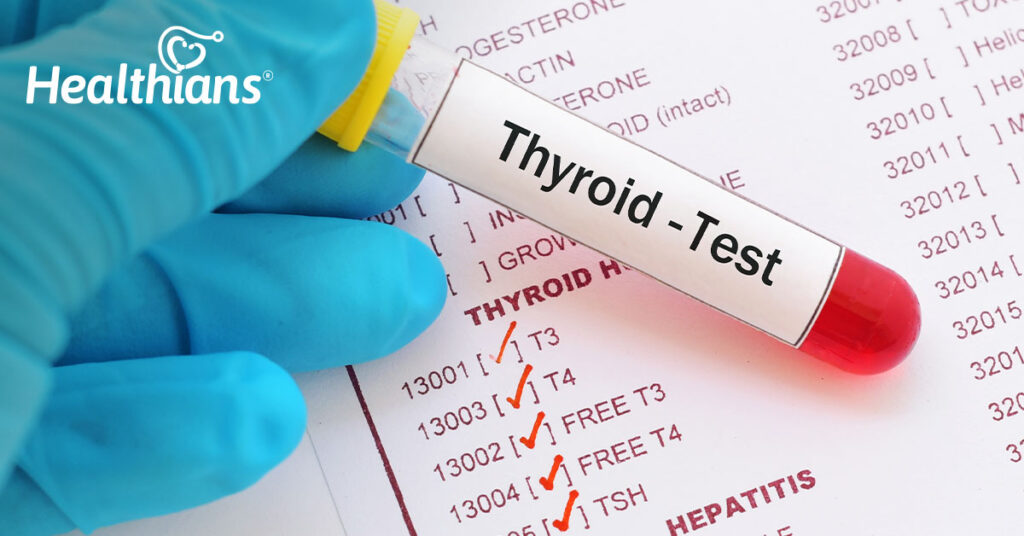Introduction
The thyroid test or thyroid function test is a collective form of blood tests that is performed to check the function of thyroid gland. The thyroid gland is a small, butterfly-shaped gland located at the base of the neck and has a huge influence on your health. Your thyroid gland produces two major hormones: Triiodothyronine (T3) and Thyroxine (T4), that regulate and ensure proper functioning of the body’s metabolism — the process by which body cells convert nutrients into energy.
Thyroid hormones have an impact on almost every organ in your body, including your heart. They assist in the regulation of vital body functions like breathing, heart rate, nervous system, body temperature, muscle strength, menstrual cycle, temperature, cholesterol levels and even your mood.
What is a Thyroid test?
A Thyroid test is a test that checks how well your thyroid gland is working. The test measures if your thyroid is making the right level of hormones.
What is it used for?
The test measures the levels of Thyroid Stimulating Hormone (TSH) using a blood sample. Thyroid Stimulating Hormone (TSH) is produced in the pituitary gland, and is responsible for regulating the balance of thyroid hormones in the blood.
The important hormones related to thyroid function includes :-
– Triiodothyronine (T3)
– Thyroxine (T4)
– Thyroid stimulating hormone (TSH)
TSH levels that are too high usually indicate hypothyroidism, or an underactive thyroid. This indicates that your thyroid isn’t producing enough hormones. As a result, the pituitary gland continues to produce and release thyroid stimulating hormone (TSH) into your bloodstream.
A low TSH level normally indicates hyperthyroidism, or an overactive thyroid. Because your thyroid produces larger amounts of TSH. the pituitary gland stops producing and releasing TSH into your blood.
If the TSH test results are not normal, you will be required to undergo at least one other test to help find the root cause of the problem.
Other names of this test: thyrotropin test.
Also read: Best And Worst Foods For Thyroid Patients
When do I need a TSH test?
Your health care professional may order a TSH test if you have symptoms of too much or too little thyroid hormone in your blood.
Hyperthyroidism (having more thyroid hormones than you need), also called overactive thyroid speeds up your metabolism and causes symptoms that include:
· Weight loss
· Rapid heartbeat
· Nervousness or irritability
· High levels of anxiety
· Trouble sleeping
· Fatigue
· Shaky hands
· Muscle weakness
· Sweating or being very sensitive to heat
· Frequent bowel movements
Hypothyroidism (having too little thyroid hormone than needed), also called underactive thyroid slows down your body functions and causes symptoms that include:
· Tiredness and exhaustion
· Weight gain
· Sensitivity to cold
· Joint and muscle pain
· Dry skin
· Dry, thinning hair
· Heavy or irregular menstrual periods
· Depression
· Constipation
You may also have a TSH test, along with other tests, to help diagnose thyroid disorders associated with hyper or hypothyroidism. These include:
· Thyroiditis
· Graves’ disease
· Hashimoto’s disease
· Thyroid tumors
· Goiter
· Thyroid nodule
· Thyroid cancer
Why is the test important?
When the thyroid produces either too many or too few hormones, it poses a serious health risk. Any imbalance can harm the cardiovascular system in the long run, so they must be controlled before it is too late. Thyroid tests are therefore necessary to understand how your body is performing in terms of thyroid hormone levels and antibodies.
It is recommended to have a blood test once a year to keep track of various health issues. However, a thyroid test may be required more frequently to monitor thyroid levels in certain special medical cases, including:
· Thyroid symptoms that are visible
· In the event of neck swelling or thickening
· If you are found to have high cholesterol levels
· If you have previously been diagnosed with a thyroid disorder
· If you have already been diagnosed with osteoporosis
· In the event of a variable heart rate
· If you have a medical history of infertility or irregular menstrual cycles
· There is a family medical history of autoimmune disorders such as type 1 diabetes and thyroid disease
· If you are planning a pregnancy and any of your parents have a family history of thyroid disorders
Also read: How Badly Thyroid Imbalance Can Ruin Your Sex Life?
Preparing for the Thyroid test
There is no need for you to do anything special in order to prepare for the thyroid function tests. If your doctor has ordered additional blood tests at the same time, you may need to fast for several hours before the test.
Final thoughts
Thyroid tests are used to diagnose thyroid disorders in their early stages. Testing is essential because it is the most precise method of assuring you that your thyroid hormones level is satisfactory and under control.
In case of any issues, the test results can assist your doctor in developing an accurate diagnosis and treatment plan. If you have any questions or concerns about your thyroid tests, consult your doctor.
Source link



